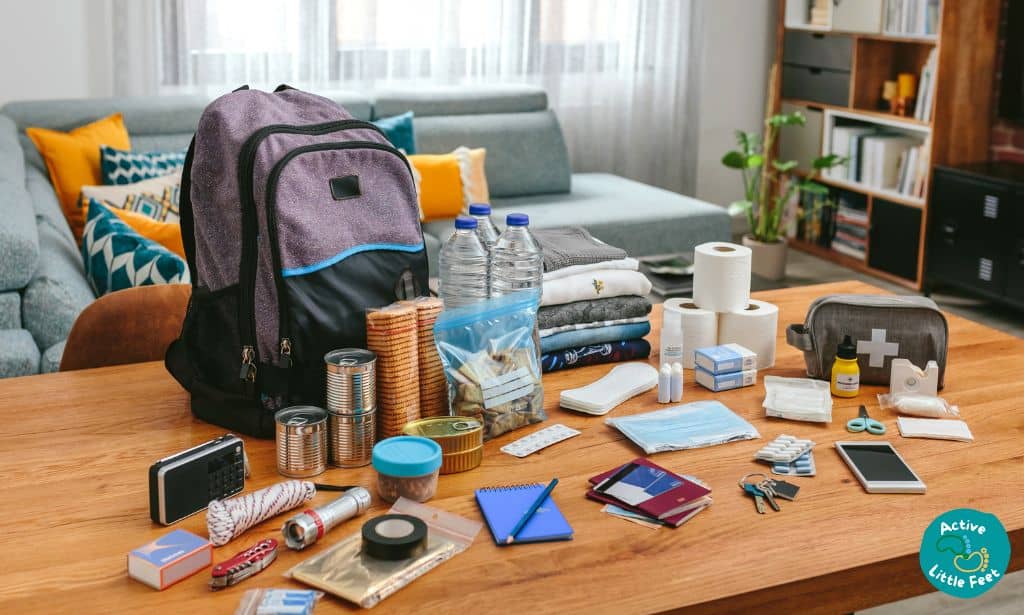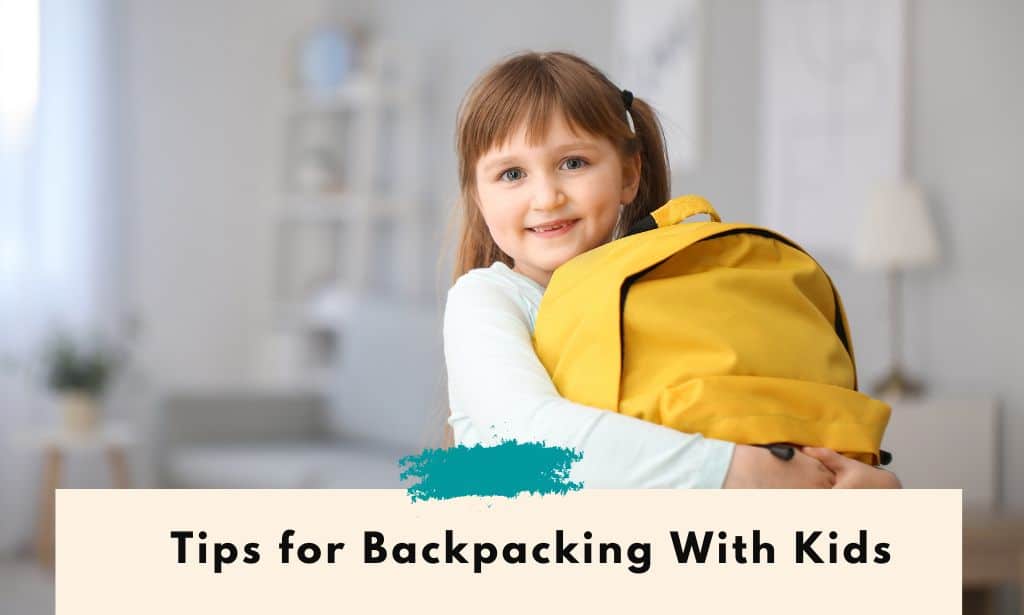This here was the view we woke up to six months ago when backpacking in the Sierra Mountains. Pete and I have been backpacking for years. In fact, it was on one of those trips that we found each other between two hiking groups staying in the same camp.
Naturally we always knew and even fantasized about doing this with our kids one day. But when that day came six years ago, none of us was prepared for the massive undertaking that is backpacking with kids.
If you are wondering, YES, it’s a completely different ball game from backpacking with adults. Kids have needs and fears that we adults do not anymore. You need to prepare more and carry a heavier backpack.
But now that we have done it enough times, I can confidently give some simple tips that we have learned from experience. These are things we actually read but never took seriously. Hopefully, you will because they come in really handy.
But first…
What Age Can Kids Go Backpacking?
REI recommends starting as early as age 3. They would know since they have been in the industry for long.
For us, we waited until the kids could hike by themselves. A backpacking load is heavy enough without having to carry your kids too. It is possible, and I’ve seen people do it, but our kids were too fat and heavy to carry over a mile when they were three.
6 Backpacking Tips with Kids
1. Start with a Test Run
The saying ‘thrown into the deep end’ does not apply to backpacking. I do not actually recommend it in anything regarding kids. Backpacking on their first outdoor adventure will likely backfire on you and ultimately turn them off from the idea of outdoor activities.
I recommend starting with a simple day hike.
Read: Reasons Kids Should Hike Plus What They Learn When Hiking
But even with this, start small and then take longer, more strenuous hikes as everyone gets used to it. As for sleeping outside, you can begin by pitching a tent in your backyard and spending the night there as a family. Introduce them to roasting s’mores, watching stars and sleeping in a tent. Hopefully they will be enjoying all of these and not feeling forced into it.
Our first overnight trip with the kiddos, we went car camping. Our beautiful country is full of camps you can drive to and join other families in a fun overnight camping session. The bonfires, the communal feeling and the activities are really fun there, so kids will enjoy and feel safe.
Once you’ve done these activities, your kids will be ready for backpacking. You’ll also learn a few things about them that will help when you don’t have a vehicle.

2. Research the Trip
You need to know much about where you plan to go with your kids for more than 24 hours. Find out the condition of the terrain, the climate, the potential dangers and the challenges you are likely to face.
Are there wild animals you should be aware of? Does the trail have a steep drop-off or unbearable rocks? Is there a water source nearby? These questions help determine if you need a change of route and what kind of gear to pack.
More importantly, find out if you need permits to stay where you are going. Book the dates on Reservation.gov, and pay in advance because it would be unfortunate to reach there and find out the place is restricted.
I use the Alltrails website or REI’s Hiking Project to find information on any trail worldwide.
3. Start Early
By this, I mean early in the morning. We have done trips where we would leave home at lunchtime and hike to our camp because no one wants to walk all day.
With kids, however, you must know that you will walk very slowly. There will be plenty of breaks to eat, drink water or just take a breather. And remember, kids have more energy in the morning hours than later in the day.
One thing we decided as parents also is that we will allow the kids to enjoy the journey, not the destination. We let them stop and play with butterflies, take pictures, and put their feet in some water. Plus hiking provides many opportunities to teach kids about nature, and we take full advantage of them.
All this means you will need more hours on the way, so you should start early. After all, you don’t want to be pitching the tent in darkness.
4. Pack a lot of Food
My husband says our kids turn into monsters when they are hungry. This is truer when we are hiking, and their speed goes down to almost zero. To avoid this we pack enough food to ensure they have something to eat every hour or two.
A big chunk of this is energy-giving snacks like energy bars, peanut chocolate and M&M’s. They can munch on these as we walk, so there’s no stopping to eat every hour.
As for food, we pack simple freezer-bag meals that don’t require much preparation. Though we try to keep them healthy, I believe backpacking is not the time to insist so much on that. What you need is convenience and energy. Plus, the chance to eat treats and things we don’t usually eat at home makes the kids happy.
5. Prepare for Boredom
Walking in silence is my favorite part of hiking, even when there are people to talk to. Kids unfortunately, cannot stand silence, and they get bored pretty quickly. A bored child is unmotivated, and soon they start asking for food and breaks and complaining about everything.
This is why we always arm ourselves with games and entertainment. My friend Michael Lazza shared a hiking game they play with his kids. One person starts a made-up story, and the rest take turns adding their own pieces to the narrative until the story develops to completion. This game takes some funny turns and keeps everyone entertained and alert.
Read: 17 Hiking Games For Kids To Try by Age
We also sing or sometimes let our teen daughter teach us Taylor Swift songs and get mad while at it. And as I said earlier, we stop every chance we get to take pictures or just smell the roses and dip our feet in some water. Everyone, except me, has a camera to take their own photos, and it has been the best part of the journey so far.
In the evenings when we finally settle down, we play cards or a board game before sleeping. Sometimes I let the kids play with their phones because they are at that age, and it’s a good compromise.

6. Pack Strategically
This must be the most important tip of all. I have 2 strategies to share;
- Pack light
Backpacking means carrying everything you take on a car camp on your back. Print this list off REI if you are not sure what to take. Try to keep the load light to avoid overtiring yourself. We choose the lightest camping gear we can find and avoid carrying unnecessary things. You do not need to carry two jackets and two pairs of clothes for example. Everyone can wear the same clothes twice, especially if it’s for one day.
- Use packing cubes
Again, you carry a lot of stuff in a backpack from clothes, camping gear, food and snacks. Separating them will make finding things easier and also prevent accidents. These packing cubes fit most things and make the backpack a bit organized.
Backpacking with kids has been a worthy venture so far. The kids have learned and grown so much, and the bonding has been amazing. I have also noticed they watch more Nat Geo and science programs now than cartoons because they want to see more places and do more.
My advice? Start now. Learn from our tips, learn from mistakes, and enjoy the journey. If you keep the attitude high throughout even when things get challenging, your kids will enjoy every second of the trip as well.




